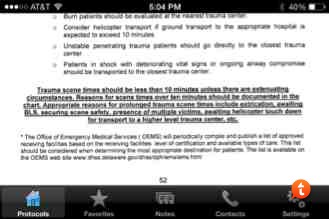"Significant mechanism of injury = impending death".
"Moving a trauma patient without full immobilization = instant paraplegia".
"More than 10 min on scene with a trauma = you just caused your patient's death". ("Unless you are waiting for the helicopter......the helicopter saves all".)
"Rapid transport = life saved"
These axioms originated in a time where a person who summoned EMS was much more likely to actually have a life threatening injury or illness, when a badly smashed up car really did indicate a decent possibility of severe injury, when we didn't have the benefit of decades of EM/EMS research, when there wasn't a hospital on every street corner, and perhaps most importantly, when EMS providers could offer very little aside from transport, anyway.
"This patient might die soon + we can't do much but drive + the hospital is far + traffic is light = LOAD & GO, and DRIVE FAST!!" Most on this forum are probably far too young to remember when that actually kind of made good sense.
Obviously, things have changed. We now have pulse oximeters, EKG's, CPAP, ventilators, drugs, defibrillators/pacers, airway devices, and a fair amount of research to guide us in how to use it all.
Still, when you are dealing with a sick patient, I think there is something to be said for the general idea of expeditiously getting them to a place that has much more diagnostic and treatment resources and expertise than we do. If things can be done just as well during transport as before, I think most of the time it is probably most prudent to do them then.
I am not aware of any reason to endorse a hard and fast "20 minute rule", but I also think that just because there isn't a ton of data proving that short scene times improve outcomes doesn't mean that we should assume it's good for patients to take our sweet time on scene.

